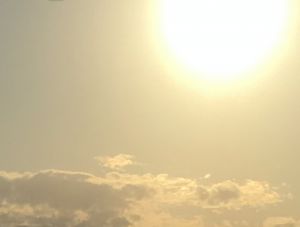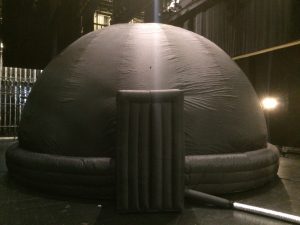 Annie Dorsen works across the fields of theater, film, dance, and digital performance. Between 2010 and 2015, she created a trilogy of algorithmic performances: Hello Hi There, A Piece of Work, and Yesterday Tomorrow. She is a 2017 recipient of the Foundation for Contemporary Arts Theater/Performance award, and a 2014 recipient of the Herb Alpert Award in the Arts. She has taught at Bard College, New York University, Fordham University, and the University of Chicago.
Annie Dorsen works across the fields of theater, film, dance, and digital performance. Between 2010 and 2015, she created a trilogy of algorithmic performances: Hello Hi There, A Piece of Work, and Yesterday Tomorrow. She is a 2017 recipient of the Foundation for Contemporary Arts Theater/Performance award, and a 2014 recipient of the Herb Alpert Award in the Arts. She has taught at Bard College, New York University, Fordham University, and the University of Chicago.
She spoke with Miriam Felton-Dansky about her work in progress for We’re Watching, titled The Great Outdoors.
Miriam Felton-Dansky: Tell me about the inspiration for the project and how it evolved from an initial idea.
Annie Dorsen: In a way it started as two projects. I had made some videos that used YouTube comments and pop songs, and I got totally fascinated by comments and commenting. I loved reading them; I find them so interesting and weird, and sometimes horrible. A comment is disconnected from a body, of course, but you can still somehow feel the person behind it. Both anonymous and very very specific. I’m interested in what language produces on its own, situations in which you have no other information about the speaker than the words—in performance contexts, when you don’t have an actor—when you just have the language in some kind of pure, readable form. Do you start to imagine bodies? Do you start to imagine characters?
Around the same time I was fantasizing about being under the stars. I thought maybe I would do a piece in a planetarium, maybe connected to research I’ve been doing on Leibniz and the origins of computer science. But at some point I moved the Leibniz material to another project and kept the planetarium for the comments. So that was the starting point: internet comments and a planetarium.
MFD: I remember you’d been describing this project in terms of landscape too. Is that still part of the project?
AD: Yes. Once I got the planetarium, and started spending some time in it, I began thinking about the sublime—that feeling of overwhelming wonder, attraction, repulsion, anxiety….it seemed connected to the notion of the Internet as a kind of virtual landscape.
And then the fourth element in the mix is entropy, which I started reading about in terms of information theory, and then later in the physics sense.
MFD: Entropy is both an information science and a natural science term, right?
AD: Right. In thermodynamics, entropy is about the expenditure of energy over time. We will eventually exhaust all available energy – this is what they call “heat death” – and the universe will wind down into a kind of undifferentiated mass of random particles. It’s also about the unidirectional nature of time: in the classic example, you can’t unmix the milk from the coffee. In the information theory sense, entropy has to do with how you measure the information content of messages. Or to put it another way, how to measure the unpredictability of data or information: the more unpredictable, the higher the information content. They’re actually the same, the info theory and the physics meanings – both are about the movement from order to disorder.
How this will all materialize in the four dimensions of the performance is still an open question.
MFD: But that might effect some kind of progression in the piece?
AD: That’s where we’re starting from, seeing if we can use entropy as a dramatic structure, or arc.
MFD: Who is collaborating with you on the piece?
AD: I’m working with a programmer named Miles Thompson, who’s done a lot of work with neural networks, machine learning. Onome Ekeh, a visual artist, and a composer named Sébastien Roux. Ryan Holsopple is designing the systems for the planetarium show, and the performer is Natalie Galpern.
MFD: How do you imagine spectators taking in this piece?
AD: I’m hoping it will feel like sitting around a digital campfire. The audience will gather around the flickering projector, with all kinds of text and stories summoned down to us from the “cloud.” I think of it as a storytelling piece, in a very old sense: we gather together to hear the stories of our ancestors. Those stories that tell a community about itself, about what it is. But what are those stories for us now? Maybe they’re coming not so much from the ancestors as from each other, right now, two seconds ago.
MFD: This collective thing, that’s bubbling up everywhere, not localized…
AD: Exactly. And then there’s the feeling you have when you’re out under the real stars. You feel dreamy, and contemplative, and open, and in a slightly altered state of awareness and relaxation. Our planetarium produces that feeling too, even though it’s clearly a digital image.
MFD: Will there be some kind of contrast between that peacefulness and the quality of the comments themselves, which might be angry, or obscene, or nonsensical?
AD: This is one of the questions we’ll be bringing into rehearsal. On the Internet, as we know well, people are extraordinarily reactive, quick to take offense. It’s not just that without body cues it’s hard to tell people’s tone—it’s also I think that we know there are terrible people out there. We assume bad intentions. In this piece, we can look at comments more as speech artifacts from the world rather than as something that implicates us in a dialogue. So maybe this question of being able to relax and look at the stars and listen to these voices coming from the ether, or from the digital realm—maybe in this context we can hear these comments with more sympathy, or at least curiosity.
MFD: What online spaces did you gather comments from? Was that an aesthetic decision?
AD: It wasn’t an aesthetic decision, but it’s had an aesthetic impact. We spent some time trying to collect different sites that had interesting comments, but not every site will let you do a big query to download comments. We ended up going for Reddit because you can take as much information as you want – and for any topic you can think of, there’s at least one subreddit devoted to that topic. We have a list of the top thousand most popular subreddits, and I’ve been picking which ones we want to keep in our mix. That’s had an aesthetic impact because even though you may have one subreddit that’s about alt-right politics, and another that’s a support group for parents of teenagers with cancer, and so on—very different styles—there is still something Reddit-ish about both of them.
MFD: The biennial’s theme is surveillance. Do you see overlap with what you’re working on in this project?
AD: Yes. First, in terms of not knowing who’s out there, who’s watching, who’s reading, who’s listening. But then…we think about surveillance as a tool of state or corporate control, but it’s also a way of watching. That slightly detached, but somehow still purposeful scanning of lots of material…it’s connected to this idea of the Internet sublime, of how we cope with the vastness of it, the virtually infinite.
Miriam Felton-Dansky is a professor in Bard’s Theater & Performance Program.
To find out more and to purchase tickets click here.